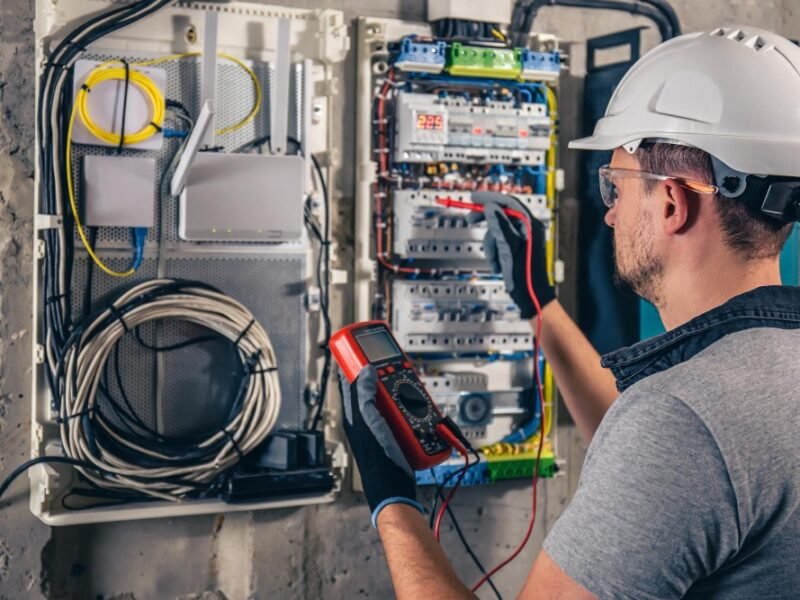Are you an experienced electrician looking for a rewarding opportunity abroad?
The United Kingdom is actively welcoming skilled professionals in the electrical industry with work permit options for 2025. With competitive salaries of up to £41,000 per year and numerous career advancement opportunities, this is your chance to take your career to the next level.
Keep reading to learn more about job requirements, application processes, benefits, and how to secure your work permit.
Key Highlights
- Job Title: Electrician
- Location: United Kingdom
- Salary: Up to £41,000 annually (£17.16 per hour)
- Work Permit: Available for qualified candidates
- Experience Required: Minimum 2-4 years
- Education: Diploma in Electrical Engineering or equivalent
Why Work as an Electrician in the UK?
The demand for electricians in the UK continues to rise due to a growing skills gap in the construction and energy sectors. By securing a work permit, you gain access to:
- Job Security: High demand for skilled electricians ensures stable employment.
- Diverse Job Opportunities: Work in residential, commercial, and industrial sectors.
- Competitive Salaries: Earn up to £41,000 annually, with growth potential.
- Career Advancement: Opportunities to specialize in renewable energy, smart home systems, and more.
- Legal Residency: The skilled work visa allows you to stay for up to five years, with the possibility of permanent residence.
Job Requirements
To qualify for electrician jobs in the UK with a work permit, candidates must meet the following requirements:
Educational Qualifications
- Diploma in Electrical Engineering or a related field.
- Completion of a certified electrician apprenticeship.
Work Experience
- Minimum 2-4 years of hands-on experience as an electrician.
- Proven track record in residential, commercial, or industrial electrical systems.
Skills and Competencies
- Ability to read and interpret electrical blueprints.
- Strong problem-solving and troubleshooting skills.
- Proficiency with hand tools and electrical testing equipment.
- Knowledge of local and national electrical codes.
Additional Requirements
- Valid driver’s license.
- ECS (Electrotechnical Certification Scheme) card (preferred but not mandatory).
- Legal permission to work in the UK.
Responsibilities of an Electrician in the UK
- Installing and maintaining electrical systems and components.
- Inspecting, testing, and repairing electrical equipment.
- Reading and interpreting blueprints and technical diagrams.
- Ensuring compliance with safety regulations and building codes.
- Diagnosing and troubleshooting electrical issues.
- Conducting routine maintenance and repairs.
- Collaborating with project managers and other tradespeople.
Benefits of Working as an Electrician in the UK
- Job Security: High demand ensures long-term employment.
- Competitive Salary: Earn up to £41,000 annually.
- Career Growth: Opportunities for specialization and advancement.
- Work-Life Balance: Many roles offer predictable schedules.
- Transferable Skills: Develop expertise that is valuable worldwide.
How to Apply for Electrician Jobs in the UK with Work Permit
Step 1: Secure a Job Offer
Before applying for a work permit, you need a valid job offer from a UK employer.
Step 2: Obtain a Certificate of Sponsorship
Your employer will provide this document, which is essential for your visa application.
Step 3: Apply for the Skilled Worker Visa
Submit your visa application online and pay the required fees.
Step 4: Prepare for Visa Decision
The processing time is typically two weeks.
Step 5: Relocate and Start Your Career
Once your visa is approved, you can move to the UK and begin your new role.
Tips for a Successful Application
- Tailor Your CV: Highlight relevant experience and certifications.
- Gather Supporting Documents: Ensure you have educational certificates, proof of experience, and identification documents.
- Stay Updated: Follow changes in visa regulations.
- Network: Connect with recruitment agencies specializing in electrical jobs.
FAQs
1. Is there a demand for electricians in the UK?
Yes, the UK is facing a skills shortage in the electrical trade, making electricians highly sought after.
2. Do electricians need a license in the UK?
An Electrotechnical Certification Scheme (ECS) card is recommended to prove your qualifications and experience.
3. What is the salary range for electricians in the UK?
The average salary for electricians is around £33,469 per year, with experienced professionals earning up to £41,000 annually.
4. Can international electricians work in the UK?
Yes, with a valid job offer and a skilled worker visa, international electricians can work in the UK.
5. How long does the skilled worker visa last?
The visa is valid for up to five years, with the option to apply for permanent residence.
6. What documents are needed for the work visa application?
You will need a job offer, a certificate of sponsorship, proof of qualifications, and identification documents.
7. Can I bring my family with me on a skilled worker visa?
Yes, your family members can join you, provided they meet the visa requirements.
8. Are there career advancement opportunities for electricians in the UK?
Absolutely, you can specialize in areas like renewable energy, smart home systems, and industrial maintenance.
9. What are the working conditions for electricians in the UK?
Electricians often work regular hours, but some projects may require overtime or night shifts.
10. Where can I find electrician job listings in the UK?
You can search on job boards such as Indeed, LinkedIn, and specialized recruitment websites.






